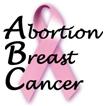If You've Had an Abortion
If You Have Had An Abortion . . .
If you have had an abortion, then be sure to inform your physician of your reproductive history and obtain his or her advice about early detection of breast cancer. Because of the active involvement of the National Cancer Institute and other anti-cancer organizations to cover up the abortion-breast cancer link, your physician might be unaware of the existing studies dating back to 1957 which have implicated abortion as a risk factor for breast cancer. We strongly recommend that you take the information from our web site and from Dr. Brind's web site (www.BCPInstitute.org) and show it to your physician.
If you have had an abortion, it is important for you to adopt strategies that will help you to reduce your risk for developing breast cancer later in life.
IF YOU ARE SINGLE:
Be abstinent until marriage. Adopt the dietary and lifestyle strategies shown in the Breast Cancer Prevention Institute's booklet, "Breast Cancer Risks and Prevention." You can find these strategies listed in the last chapter of the booklet here:
http://bcpinstitute.org/booklet4.htm
IF YOU ARE MARRIED:
Scientists agree that the best way to prevent breast cancer is to have more children, starting before age 24, and breastfeed them longer.
A first FULL TERM pregnancy is the only event in a woman's life that matures 85% of her cancer-susceptible Type 1 and 2 breast lobules into fully cancer-resistant Type 4 lobules. This maturing process only occurs during the last months of a full term pregnancy. 1
Breast cancer risk declines by an additional 10% with every subsequent full term pregnancy.
Research commissioned by the U.S. National Cancer Institute shows that the sooner a woman has a full term pregnancy and breastfeeds her baby after having had an abortion, the more she will reduce the breast cancer risk she incurred because of that abortion. 2
The longer a woman breastfeeds during her lifetime, the lower her breast cancer risk is. 3
For a list of other dietary and lifestyle strategies that will help you reduce your breast cancer risk, see the Breast Cancer Prevention Institute's booklet entitled, "Breast Cancer Risks and Prevention" and read the last chapter here:
http://bcpinstitute.org/booklet4.htm
- 1. Russo J, et al. Cancer Research 1988;48:2837-2857; and Russo J, Russo IH. "Development of the human mammary gland," in Neville MD, Daniel C (ed); The Mammary Gland, Plenum, NY 1987;67-93
- 2. Daling JR, et al. J Natl Cancer Inst 1994;86:1584-1592. White E, et al. J Natl Cancer Inst 1994;86:505-514
- 3. Beral V, et al. Breast cancer and breastfeeding: collaborative re-analysis of individual data from 47 epidemiological studies in 30 countries, including 50,302 women with breast cancer and 96,973 women without the disease. Lancet 2002;360:187-195

